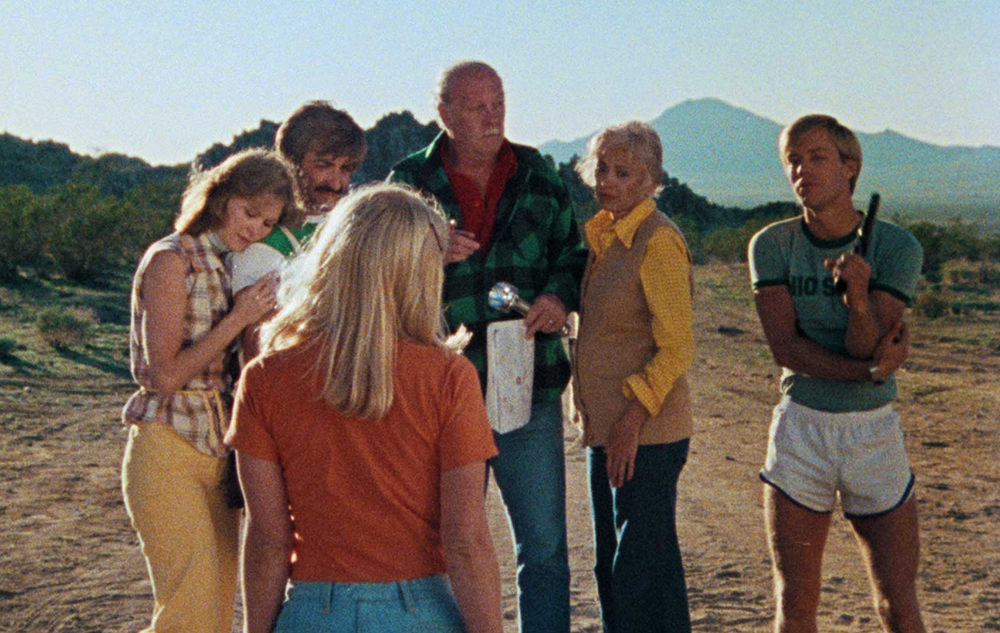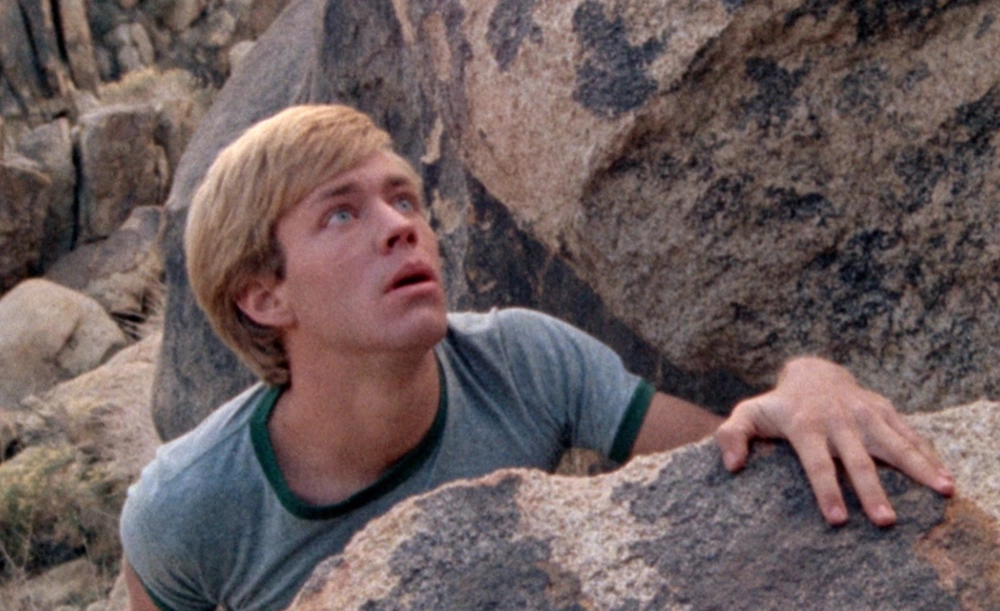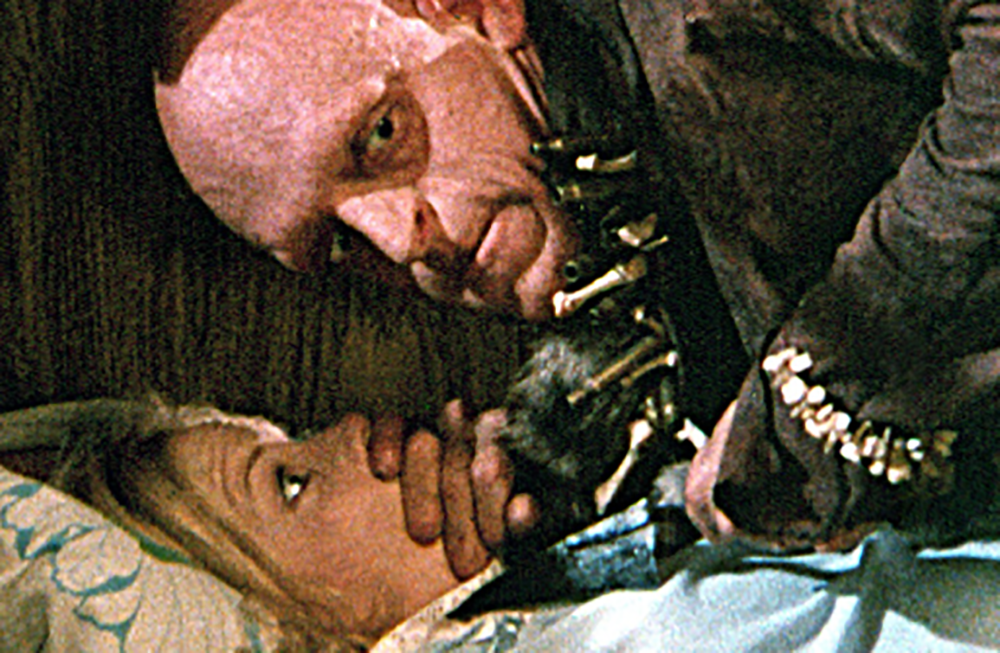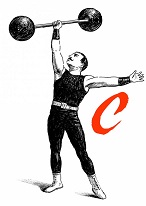Not the horror maker’s first film, but still seven years before his iconic “A Nightmare on Elm Street,” Wes Craven’s “The Hills Have Eyes” is a decent attempt. It has its issues. It lags in the first half and relies on little in the way of special effects. Its villains seem too human and too basked in the light of day for much of the film to genuinely terrify. The movie, with its incestuous miscreant family motif, certainly borrowed from Tobe Hooper’s infamous “Texas Chainsaw Massacre,” released only three years earlier. Still, the film tries. When a California-bound family’s car breaks down en route to their destination—and winds up outside an abandoned US Air Force base—a group of inbred scavengers insist on making their lives a living hell. And for the most part it works.
The early parts of “The Hills Have Eyes” have familiar material… but familiar only because others films that followed would copy it. The California family stops at a gas station, encountering the mysterious ‘Fred,’ played perfectly by John Steadman. He’s an old man content in his ways, warning the interlopers to just mosey on down the highway and not stop at the Air Force base like they want to. “Just stick to the main road,” he warns—just like Crazy Ralph in “Friday the 13th.” “The other side of the highway just has animals…”
Familiar Stuff… but ‘Hills’ Did it First
Of course it’s not coyotes and foxes he’s talking about, but the carnivorous inbred family which lacks a surname in these proceedings. They all go by various Roman gods (Pluto, Mercury, etc.) and talk to each other on stolen USAF walkie talkies. They have a sister, Ruby (played by Janus Blythe), who seems to want to get out, but can’t get the nerve. But it’s all for naught. Later that night—after their car breaks down—Fred, the traveling family patriarch ‘Big Bob’ Carter (Russ Grieve), and others will become the victims of the villainous family. Not even the dogs are safe.
What makes the first half of “The Hills Have Eyes” drag—and fail to bring the thrills—lies in the lack of stage setting and the bright desert sun. It also doesn’t help that the inbred family (even Pluto, played by Michael Berryman, who is supposed to look deformed) seem too normal, if that’s the right word. They speak in regular English with a slightly hickish dialect, and it’s not lost that the film was doubtless inspired by “Deliverance,” released five years before it. Although “Hills” intends to be a straight horror picture, whereas “Deliverance” devolved into a strange survival/moral tale I found somewhat irritating. But I digress.
Sometimes it Shows Too Much

The cast of characters are likable enough. The film stars—alongside the aforementioned Russ Grieve—Susan Lanier, Robert Houston, Virginia Vincent, Dee Wallace, and Martin Speer. These are the California-bound Carter family. Some are better than others, but they all play their role. You have to forgive “Hills” for the time… especially the ‘men have to protect the women’ mentality of the males, and Big Bob’s casual racism as he recounts his time spent as a Cleveland cop. But they seem a tight family unit. This idea must have been horrific in the ‘70s: a middle class, white family tries to travel cross country and are attacked and tortured by a group of inbred mutants. Some early scenes drag, but later scenes (such as the attack of poor Big Bob and one of the family’s dogs) are rightly frightful.
“Hills” suffers in the portrayal of the villains, unfortunately, showing way too much. We get full conversations between the animal family, most of whom look like they are dressed from the set of some prehistoric film about cavemen. But they talk too well. They talk so well, in fact, that two of them are able to impersonate USAF personnel later in the film via walkie talkie. They are played by the aforementioned Janus Blythe, Peter Locke, James Whitworth, Lance Gordon, and Cordy Clark. Most of their family scenes don’t work, but a few early interactions with the Carters—namely one chill-inducing scene inside the camper—show the family’s dark side.
Still, Ahead of its Time

The latter half of the film, however, feels tighter. Once the crazy family attacks Fred and Big Bob (no spoilers… but what happens is pretty brutal for 1977), the film picks up a pretty good pace. The Carter family behave relatively rationally, even as their baby is stolen (Brenda Marinoff is credited as playing baby Katy). The crazy family wants to eat the baby, referring to it as a prize turkey. Watching this in 2024—compared to a legion of “Saw” films and other torture cinema—seems pale in comparison. But remember, this was 1977, and I’m sure this was nightmarish back then. Some additional run-ins between the Carters and the mutants set the stage for a final confrontation that defies the ‘final girl’ stereotype that would become cannon, which I liked. It also features a scene with the Carter’s dog which I had never before seen in a horror film. “Hills,” in some respects, was ahead of its time.
All-in-all, Craven’s film is imperfect but tries. I found it infinitely more digestible than his first, “Last House on the Left.” This film is more tonally consistent and far less nihilistic and brutal. It has its scenes—poor Big Bob its chief offender—and manages to be scary and thrilling along the way. Its villains suffer, and are vastly outdone in the 2006 remake by Alexandre Aja, which upped the ante on their depravity and perversity. But it’s all forgivable. For 1977, “The Hills Have Eyes” is a passable thriller, featuring Dee Wallace—who would go on to star in bigger films—and is certainly a creepy way to spend this Halloween under the right circumstances.



